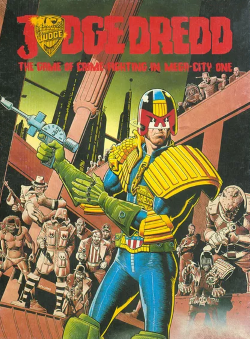Reception
Richard Meadows reviewed Judge Dredd for White Dwarf No. 35 (also published by GW), giving it an overall rating of 9 out of 10, and stated that "Judge Dredd is a good game for some light relaxation for both Dredd fans and those who have never heard of him. It is admirably successful in its aims: it doesn't set out to be a game of deep skills and great complexity; it sets out to be simple, playable and as enjoyable as reading your favourite comic book - and if Judge Dredd is your favourite comic-book hero, so much the better." [3]
Paul Cockburn reviewed Judge Dredd for Imagine magazine, and called it "a fine game, with excellent opportunities for player inter-action and fine balance. If you like mayhem, this has to be a winner". [4]
In Issue 76 of Dragon (August 1983), Michael Gray thought the game "captures the theme" through the "appealing artwork." However, Gray found Judge Dredd could be "quite a frustrating exercise" because of the propensity of players to gang up on someone who appears to be winning. He didn't think this was a terribly complex game, warning players that "it takes no brainpower to play." He concluded with ambivalence, saying, "Judge Dredd is fun, but other games are fun and have more going for them as well." [2]
Steve Jackson reviewed Judge Dredd in Space Gamer No. 67. [1] Jackson commented that "If you're a Judge Dredd fan, you'll buy it no matter what the reviews say, so be comforted; you will like it. In fact, it works both ways; I became a fan after reading through the game. If you don't read Judge Dredd, you might still enjoy it as a beer-and-pretzels game (albeit a long one), if you can handle the steep imported price tag." [1]
This page is based on this
Wikipedia article Text is available under the
CC BY-SA 4.0 license; additional terms may apply.
Images, videos and audio are available under their respective licenses.

